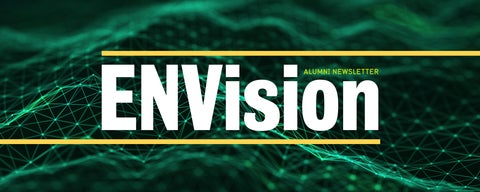
Stay connected with the Faculty of Environment and the growing global community that includes over 52,750 alumni.
Subscribe to ENVision — our alumni and friends newsletter — and receive each issue directly to your inbox and read past issues below.
The latest issue
With the Olympics taking place this year, we are once again reminded of the power of global collaboration. Friendship, respect and excellence have brought the world together, and these Olympic values resonate strongly with us at the Faculty of Environment as we work with the world, for the world.
In this issue of ENVision, you will discover some of the remarkable ways our faculty is acting with purpose for the benefit of people and planet. From safeguarding the Winter Olympics to quantifying the environmental impacts of space activity, our faculty, students and partners continue to make important advances that strengthen our understanding of the world around us.
We are also pleased to celebrate the 2025 Alumni Award winners and share their inspiring achievements. The contributions of our alumni continue to shape the world in meaningful and lasting ways. I offer my sincere congratulations to these incredible recipients and look forward to connecting with our alumni locally and around the world in the coming year.
May these stories and updates spark new ideas.
Read our past issues
Like what you see? Email us to access stories older than three years.
The publishing team
Advisor
Bruce
Frayne
Dean,
Faculty
of
Environment
Editors
Melissa Cousineau
Director, Advancement
Rebecca Wickens
Director, Strategic Initiatives & Communications
Content curators
Chantal Vallis
Communications Manager
Dheana Ramsay
Senior Alumni Advancement Manager